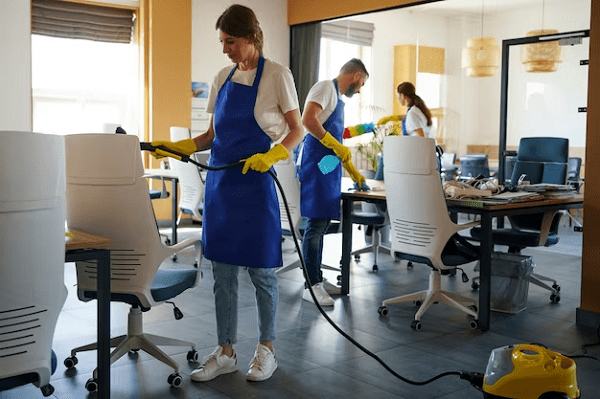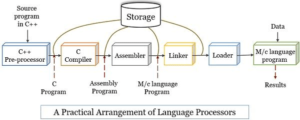Co‐ordination of Housekeeping with other departments- Coordinating housekeeping with other departments in an organization, especially in the hospitality and service industry, is crucial for ensuring a seamless and efficient operation. This coordination involves communication, planning, and teamwork to maintain a clean and welcoming environment for guests or employees. Here are some key aspects to consider when coordinating housekeeping with other departments:
- Communication:
- Establish open lines of communication between the housekeeping department and other departments, such as front desk, maintenance, food and beverage, and management.
- Hold regular meetings or use communication tools like emails, phone calls, or messaging apps to exchange information and updates.
- Scheduling:
- Coordinate schedules to ensure that housekeeping staff is available when needed, especially during high-occupancy periods or peak service hours.
- Consider factors like room turnover, events, and maintenance activities that may impact housekeeping.
- Room Assignment:
- Ensure smooth room assignments by coordinating with the front desk to provide clean and prepared rooms as soon as guests check in.
- Communicate any special requests, room changes, or maintenance issues promptly.
- Maintenance and Repairs:
- Collaborate with the maintenance department to address any maintenance or repair issues in guest rooms, public areas, and facilities.
- Create a system for reporting and tracking maintenance requests.
- Inventory Management:
- Coordinate with the purchasing department to maintain an adequate supply of cleaning materials and amenities.
- Monitor and replenish supplies as needed, ensuring housekeeping staff has what they require to perform their duties.
- Guest Requests:
- Work closely with the front desk to address guest requests, such as extra towels, room service, or special accommodations.
- Ensure that housekeeping staff is aware of any specific guest preferences.
- Special Events and Meetings:
- If your organization hosts special events or meetings, coordinate with the events or conference department to prepare the required spaces, arrange for cleaning, and ensure setup and teardown go smoothly.
- Training and Cross-Training:
- Provide cross-training opportunities for housekeeping staff so they can assist in other departments during peak periods, such as helping with luggage or room service.
- Training staff on how to handle emergencies, like evacuations or security situations, is also important.
- Quality Control:
- Implement quality control measures to ensure that housekeeping standards are maintained consistently.
- Encourage feedback from other departments and guests to identify areas for improvement.
- Emergency Response:
- Develop and communicate emergency response plans to all departments, including housekeeping, so that everyone knows their roles during emergencies like fires or natural disasters.
- Feedback and Improvement:
- Encourage feedback from other departments about the housekeeping service and be receptive to suggestions for improvement.
- Continuously review and adjust coordination procedures to enhance efficiency.
Effective coordination between housekeeping and other departments is essential for creating a positive guest or employee experience and maintaining the reputation of the organization. Open communication, clear protocols, and a strong team spirit are key to successful coordination.
What is Co‐ordination of Housekeeping with other departments
The coordination of housekeeping with other departments in an organization, particularly in the context of the hospitality and service industry, refers to the strategic management of activities, resources, and communication between the housekeeping department and various other departments or functional areas within the same organization. The goal of such coordination is to ensure the efficient and seamless operation of the organization, with a particular focus on maintaining cleanliness, hygiene, and a welcoming environment.
Here are some key elements involved in the coordination of housekeeping with other departments:
- Front Desk/Reception: The front desk and housekeeping need to work closely to manage room assignments, check-ins, check-outs, and guest requests effectively. This ensures that rooms are cleaned promptly and ready for new guests.
- Maintenance: Collaboration with the maintenance department is vital to address any repairs, maintenance issues, or room refurbishments promptly. A well-maintained facility is essential for the guest experience.
- Food and Beverage: Housekeeping may coordinate with the food and beverage department for cleaning dining areas and managing table turnover during peak dining hours. In some cases, there may also be room service coordination.
- Guest Services: Ensuring that guest requests for extra amenities or special room setups are communicated and fulfilled, often involving communication with guest services or concierge.
- Events and Conferences: When the organization hosts events or conferences, housekeeping should coordinate with the event management team to prepare and maintain spaces.
- Security and Safety: Collaborating with the security department is essential for addressing security concerns and ensuring a safe environment for guests and employees.
- Inventory Management: Coordinating with purchasing or procurement departments to manage the inventory of cleaning supplies, amenities, and linens, ensuring that housekeeping staff have what they need.
- Human Resources and Training: Human resources may work closely with housekeeping to recruit, train, and manage staff. Cross-training opportunities and performance management are often coordinated through HR.
- Quality Control and Standards: Collaboration with quality control teams to ensure that housekeeping services meet the organization’s standards and maintaining consistent quality.
- Guest Feedback and Concerns: Housekeeping should collaborate with customer relations or guest feedback departments to address and resolve guest concerns related to cleanliness or housekeeping services.
- Communication: Effective communication is essential to share information, updates, and changes in schedules or priorities between the housekeeping department and other departments.
- Emergency Response: Coordinating emergency response plans with other departments to ensure that everyone knows their roles during emergencies, such as evacuations or security incidents.
Effective coordination of housekeeping with other departments is crucial for delivering a positive guest experience, maintaining a well-functioning organization, and upholding the organization’s reputation. Open lines of communication, clear protocols, and teamwork are fundamental to achieving these goals.
Who is Required Co‐ordination of Housekeeping with other departments
The coordination of housekeeping with other departments is required in organizations, primarily within the hospitality and service industry, where the quality of cleanliness, maintenance, and overall guest experience is of paramount importance. This coordination is necessary to ensure the smooth and efficient operation of the organization. The departments that typically require coordination with the housekeeping department include:
- Front Desk/Reception: Ensuring that rooms are cleaned and prepared for incoming guests, handling check-ins and check-outs, and managing guest requests.
- Maintenance: Addressing repair and maintenance issues to maintain a well-maintained facility.
- Food and Beverage: Coordinating with dining areas to manage cleanliness during meal service times and providing room service if applicable.
- Guest Services/Concierge: Handling guest requests and special room setups.
- Events and Conferences: Preparing and maintaining spaces for events and conferences hosted by the organization.
- Security and Safety: Ensuring the safety and security of guests and employees.
- Inventory Management: Managing the inventory of cleaning supplies, linens, and amenities.
- Human Resources and Training: Recruiting, training, and managing housekeeping staff, often with cross-training opportunities.
- Quality Control and Standards: Ensuring that housekeeping services meet the organization’s quality standards.
- Guest Feedback and Concerns: Addressing and resolving guest concerns related to cleanliness and housekeeping services.
- Communication: Sharing information, updates, and changes in schedules or priorities between the housekeeping department and other departments.
- Emergency Response: Coordinating emergency response plans with other departments to ensure a coordinated response during emergencies.
The exact departments involved may vary depending on the organization’s size, structure, and industry. In the hospitality sector, hotels, resorts, cruise ships, and similar establishments place a strong emphasis on housekeeping coordination due to their direct impact on the guest experience. In healthcare settings, coordination between housekeeping and healthcare staff is essential to maintain a clean and hygienic environment. In the corporate world, facility management often oversees the coordination between housekeeping and other departments to ensure a clean and functional workplace.
In summary, the required coordination of housekeeping with other departments is context-specific, and it depends on the organization’s type, industry, and specific operational needs.
When is Required Co‐ordination of Housekeeping with other departments

The coordination of housekeeping with other departments is required in various situations and circumstances, depending on the organization’s type and industry. Here are some common instances when coordination between the housekeeping department and other departments is necessary:
- Daily Operations: Daily coordination is essential in the hospitality industry, where housekeeping needs to work closely with the front desk to manage room assignments, check-ins, and check-outs. It ensures that rooms are cleaned promptly and ready for new guests.
- Maintenance and Repairs: Whenever there are maintenance or repair issues in guest rooms, public areas, or facilities, coordination between housekeeping and the maintenance department is necessary to address and resolve them quickly.
- Special Events and Functions: When the organization hosts special events, conferences, weddings, or meetings, coordination with the events or catering departments is required to prepare and maintain event spaces.
- Emergency Situations: During emergency situations, such as fires, natural disasters, or security incidents, all departments, including housekeeping, need to coordinate their efforts to ensure the safety and well-being of guests or employees.
- Inventory Management: Coordinating with the purchasing or procurement departments is necessary to manage the inventory of cleaning supplies, amenities, and linens, ensuring that housekeeping staff have the necessary resources to perform their duties.
- Guest Requests and Preferences: Guest services and housekeeping must coordinate to address guest requests for extra amenities, special room setups, or room changes promptly.
- Quality Control and Inspections: Regular coordination with quality control or inspection teams helps maintain consistent standards in cleanliness and service quality.
- Facility Refurbishments: When rooms or facilities require refurbishment or updates, coordination with housekeeping is essential to minimize disruptions to guests and ensure smooth transitions.
- Cross-Training and Staffing: Coordination for cross-training opportunities, staffing during peak periods, and handling employee-related matters often occurs between the housekeeping department and human resources.
- Special Circumstances: Certain situations may require specific coordination. For example, coordinating with the housekeeping department may be necessary in a hospital setting to maintain a clean and hygienic environment in patient rooms.
The need for coordination can vary depending on the organization’s type and size. However, in any organization where cleanliness, hygiene, and guest or employee experience are critical, regular coordination between housekeeping and other departments is crucial to ensure efficient and effective operations. Open lines of communication and clear protocols are key to successful coordination in these various situations.
Where is Required Co‐ordination of Housekeeping with other departments
The coordination of housekeeping with other departments is typically required in various types of organizations, especially those in the hospitality and service industries. Here are some specific places or settings where such coordination is crucial:
- Hotels and Resorts: In these establishments, coordination between housekeeping and departments like front desk, maintenance, food and beverage, and guest services is essential for maintaining a pleasant guest experience.
- Hospitals and Healthcare Facilities: In healthcare settings, housekeeping must coordinate with various departments to ensure a clean and hygienic environment, including coordination with nursing, facilities management, and patient services.
- Cruise Ships: On cruise ships, housekeeping coordination is critical for maintaining cleanliness, handling room assignments, and ensuring the overall guest experience.
- Corporate Offices: In office buildings, coordination between housekeeping and facility management is required to maintain a clean and organized workplace, manage inventory, and coordinate during special events or refurbishments.
- Restaurants and Catering Services: Restaurants and catering businesses require coordination between housekeeping and food and beverage departments, especially during meal service and event setups.
- Event Venues and Convention Centers: For venues hosting events and conferences, coordination between housekeeping and event management teams is vital for maintaining cleanliness and meeting the needs of event organizers and attendees.
- Higher Education Institutions: Colleges and universities require coordination between housekeeping and various departments to maintain cleanliness in dormitories, classrooms, and common areas.
- Residential Communities: In apartment buildings or residential communities, coordination with property management or homeowners’ associations is important to maintain common areas and uphold property values.
- Retail and Shopping Centers: Retail establishments often require coordination between housekeeping and the store management to maintain a clean and welcoming shopping environment.
- Transportation Services: Airlines, trains, and bus companies require coordination between housekeeping and various departments to ensure clean and well-maintained vehicles and terminals.
- Sports and Entertainment Venues: Stadiums and entertainment venues need to coordinate housekeeping with event management and facilities departments to keep the premises clean and ready for events.
- Government Buildings: Government offices and buildings require coordination between housekeeping and facility management to maintain cleanliness and safety.
In essence, the required coordination of housekeeping with other departments can be found in a wide range of settings where cleanliness and guest or occupant experience are important. The specifics of coordination may vary based on the organization’s type, size, and industry, but it is always critical for the smooth operation of the facility or establishment.
How is Required Co‐ordination of Housekeeping with other departments
The coordination of housekeeping with other departments is vital for the efficient and effective operation of various organizations. Here’s how this coordination is typically achieved:
- Establish Clear Communication Channels: Open and effective communication is the foundation of coordination. Create regular channels for communication between the housekeeping department and other departments, which may include meetings, email, phone calls, or messaging apps.
- Define Roles and Responsibilities: Clearly define the roles and responsibilities of each department regarding housekeeping activities. Ensure that everyone knows what is expected of them and when.
- Regular Meetings: Hold regular meetings to discuss upcoming events, changes in schedules, and any specific requirements or challenges. Meetings provide an opportunity to share information and address concerns.
- Use Technology: Utilize technology to streamline coordination. Property management systems (PMS) and task management software can help departments share information and updates in real-time.
- Scheduling: Coordinate schedules to ensure that housekeeping staff is available when needed. This includes ensuring that rooms are cleaned promptly between guest check-outs and check-ins.
- Room Assignment: Work closely with the front desk or room assignment department to ensure that guests are placed in clean and prepared rooms upon check-in.
- Maintenance Coordination: Collaborate with the maintenance department to address maintenance issues promptly, reducing downtime and guest inconveniences.
- Special Events Planning: When hosting special events or conferences, plan and coordinate housekeeping activities to accommodate increased demand for cleaning services and room setup.
- Emergency Response Plans: Develop and communicate emergency response plans, so all departments know their roles during emergencies like evacuations or security incidents.
- Quality Control: Implement quality control measures to ensure housekeeping standards are maintained consistently. Regular inspections and feedback can help improve the quality of service.
- Cross-Training: Consider cross-training opportunities for housekeeping staff so they can assist other departments during peak periods or emergencies.
- Guest Feedback: Encourage feedback from other departments and guests to identify areas for improvement in housekeeping services.
- Inventory Management: Coordinate with the purchasing department to manage and replenish cleaning supplies, linens, and amenities.
- Regular Assessment: Periodically assess the coordination process to identify areas for improvement. Make necessary adjustments to enhance efficiency and effectiveness.
- Feedback Loops: Implement feedback loops and mechanisms to ensure that departments can communicate concerns, challenges, or special requests effectively.
Effective coordination of housekeeping with other departments involves clear communication, defined processes, and a commitment to working together to provide a seamless experience for guests or occupants. It’s essential to adapt coordination strategies to the specific needs and demands of your organization and industry.
Case Study on Co‐ordination of Housekeeping with other departments
Coordinating Housekeeping in a Luxury Hotel
Background: A luxury hotel, “Grand Serenity Hotel,” situated in a bustling city, prides itself on providing exceptional guest experiences. The hotel has 300 rooms, multiple restaurants, a spa, and a conference center. The housekeeping department is crucial to maintaining the hotel’s reputation for cleanliness, comfort, and luxury.
Challenges:
- High Guest Turnover: The hotel experiences high occupancy throughout the year, with a constant influx of guests checking in and out.
- Multiple Facilities: The hotel has several restaurants, event spaces, and a spa, each with its unique cleaning needs.
- Maintenance: Routine maintenance and repairs are necessary to keep the facility in top condition.
- Special Events: The hotel often hosts weddings, conferences, and social events, which require detailed planning and coordination.
Solutions:
- Daily Meetings: The management introduced daily morning meetings involving the housekeeping department, front desk, and maintenance team. These meetings discuss room assignments, maintenance issues, and any guest requests or preferences.
- Cross-Training: Housekeeping staff received cross-training to assist with room service during peak dining hours and to help the front desk during check-in and check-out times.
- Special Event Coordinators: For events and conferences, the hotel appointed special event coordinators who act as a bridge between the event organizers, the kitchen staff, and housekeeping to ensure the seamless execution of events.
- Inventory Management: The housekeeping department maintains close coordination with the purchasing department to monitor the stock of cleaning supplies, linens, and guest amenities. They have a real-time inventory system to ensure supplies are never exhausted.
- Quality Control: The hotel implemented a rigorous quality control system where random room inspections are conducted by supervisors from various departments, providing feedback to the housekeeping team for continuous improvement.
- Communication Tools: The hotel adopted a property management system (PMS) that all departments could access. It allowed instant communication and real-time updates, making coordination smoother.
Outcomes:
- Improved Guest Satisfaction: The seamless coordination between housekeeping and other departments led to improved guest satisfaction. Clean and well-prepared rooms, timely room service, and quick issue resolution were noted in guest reviews.
- Efficient Operations: By working together closely, the hotel was able to optimize staffing, which led to more efficient operations and reduced labor costs.
- Higher Revenue: The successful coordination facilitated the hosting of more successful events and conferences, increasing the hotel’s revenue.
- Enhanced Staff Morale: Cross-training opportunities and a sense of shared responsibility boosted staff morale and created a more cooperative work environment.
- Consistent Quality: Regular quality control checks ensured that cleanliness and service quality were maintained at the highest standards.
Conclusion: Coordinating housekeeping with other departments is paramount in the hospitality industry, especially in a luxury hotel like Grand Serenity Hotel. The seamless integration of housekeeping with front desk, maintenance, and special event coordination significantly contributed to the hotel’s success, leading to higher guest satisfaction, increased revenue, and efficient operations. The case study demonstrates the value of interdepartmental collaboration in achieving and maintaining high service standards in a competitive market.
White paper on Co‐ordination of Housekeeping with other departments
A Key to Hospitality Excellence
Abstract: This white paper explores the critical role of coordinating housekeeping with various other departments in the hospitality industry. It provides insights, strategies, and best practices for ensuring that housekeeping operations are seamlessly integrated with other functional areas within an organization. Effective coordination leads to enhanced guest satisfaction, streamlined operations, and the maintenance of a positive reputation for an organization.
Table of Contents:
- Introduction
- Overview of the Importance of Housekeeping
- The Significance of Coordinating with Other Departments
- Challenges and Consequences
- Common Challenges in Housekeeping Coordination
- Consequences of Poor Coordination
- The Key Departments in Housekeeping Coordination
- Front Desk and Guest Services
- Maintenance and Repairs
- Food and Beverage
- Special Events and Conferences
- Emergency Response Teams
- Inventory Management
- Human Resources and Training
- Strategies for Effective Coordination
- Establishing Clear Communication Channels
- Defining Roles and Responsibilities
- Regular Meetings and Collaboration
- Leveraging Technology
- Cross-Training Opportunities
- Quality Control and Inspections
- Inventory Management
- Feedback Loops
- Case Studies
- Real-world examples of successful housekeeping coordination in various hospitality settings.
- Benefits of Effective Coordination
- Enhanced Guest Satisfaction
- Efficient Operations
- Revenue Growth
- Staff Morale and Development
- Consistent Quality and Reputation Management
- Barriers to Coordination
- Identifying common barriers to effective coordination and strategies to overcome them.
- Best Practices
- A compilation of best practices and tips for successful housekeeping coordination.
- Conclusion
- Recap of the significance of coordination for housekeeping and its impact on overall hospitality excellence.
- Recommendations
- Suggested actions for organizations to improve housekeeping coordination in their operations.
- References
- A list of resources and references for further reading.
Conclusion: Coordinating housekeeping with other departments is an essential aspect of achieving and maintaining excellence in the hospitality industry. This white paper has provided insights into the various departments involved, strategies for effective coordination, real-world case studies, and the significant benefits that result from such coordination. By implementing the recommendations and best practices outlined in this white paper, organizations can enhance their guest satisfaction, streamline operations, and uphold a positive reputation in a highly competitive industry. Effective coordination is the key to success in the ever-evolving world of hospitality.





